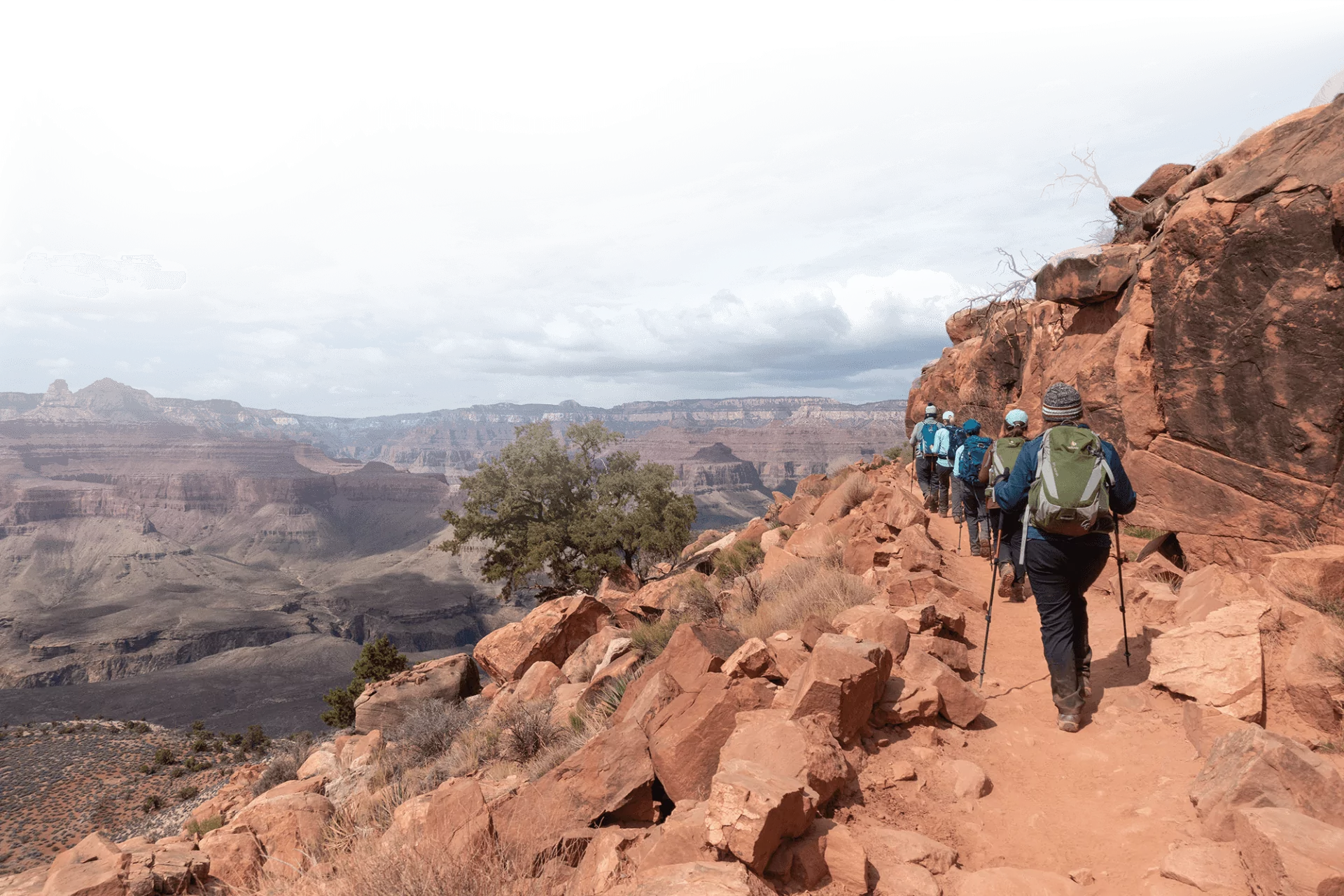Purchasing Gear for the Greater Good: The Ten Essentials
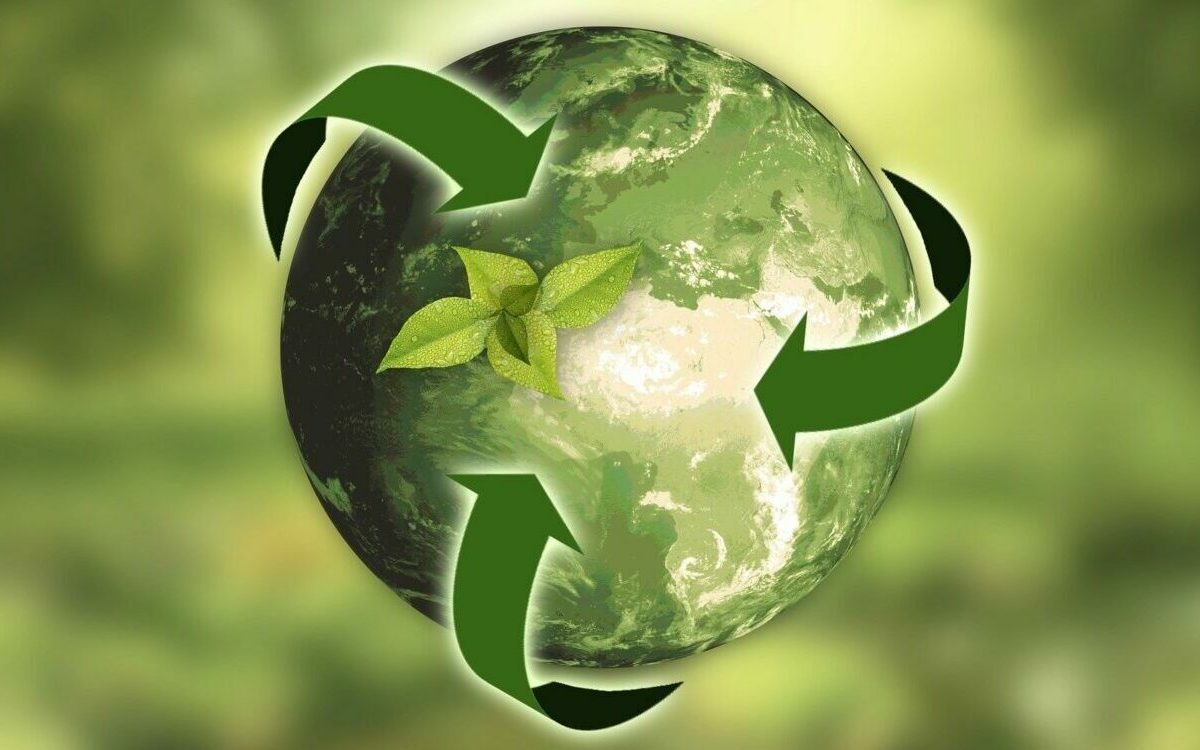
The Ten Essentials should always be in your pack. You need them whether you are out for an easy day-hike or a multi-day, epic backpacking adventure. Carrying and using the 10 Essentials may save lives. Life or death situations can happen in the blink of an eye. When on a Wildland Trekking adventure, your guides have these essential items in their pack at all times. And we’ve purchased them from brands that we know create ethical outdoor gear.
There are endless articles and You-Tube videos explaining why the 10 Essentials are so vitally important to any successful adventure. However, is there a way to purchase these all-important items and — at the same time — give back to the environment? The simple answer is yes. This article provides a list of the 10 Essentials, a brief explanation of why these items are important, and outlines some companies that sell these necessary items while giving back to the greater good.
The Ten Essentials #1: Emergency Shelter
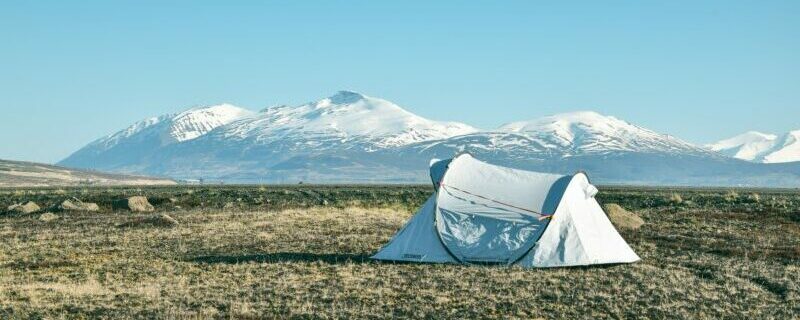
The Survival Rule of Threes states that we can survive only three hours without shelter. Exposure to heat and cold is one of the leading causes of death in the backcountry every year. Preparation is key to safety and survival. Yes, you can learn how to build an emergency debris shelter. However, a good debris shelter takes time, energy, and lots of scavenged materials to construct. Carrying an emergency shelter – like a tent, bivy, or tarp – is a more reliable option. You can erect a pre-made emergency shelter in minutes, saving you time and energy — which could ultimately save your life. While choosing which tent, bivy, or tarp to purchase, consider buying a tent from Kelty, Big Agnes, Nemo, or Marmot. These companies are actively involved in conservation and community.
Kelty Tents
Along with Patagonia, The North Face, and REI, Kelty is one of the co-founders of the Conservation Alliance, which advocates for our wild spaces. But Kelty’s interest in the greater good does not stop there. Kelty has a well-established social responsibility policy, the Exxel Outdoors Code of Conduct. This company established its Exxel policy in 1995 with the purpose of making sure that Kelty’s manufacturing processes do not harm the environment.
Kelty has developed the Cure for the Common Kid program. This company designed this program to encourage kids and families to spend more time outside. One percent of sales on kid-related products at Kelty’s website supports the Cure for the Common Kid Fund. Together with other like-minded organizations, the Cure for the Common Kid Fund offers gear and financial support to enable children to experience outdoor activities.
Another way Kelty gets kids outdoors is by contributing to the Wish for Wheels program, which puts kids on bikes. In addition, this company supports the annual Bike to Work Day across the United States.
Big Agnes Tents
Big Agnes donates funds and actively supports organizations that are looking at the bigger picture in conservation, sustainability, and equality. For this brand, social and environmental responsibility is a year-round initiative. They have launched the Re-Routt Collection – a line of products that are constructed using recycled fabrics, fills, and hardware.
Nemo Tents
Nemo wants to minimize its impact on the planet and wild spaces by creating long-lasting products that can be repaired instead of thrown away. It also wants to empower others to make a difference; they have developed the GO HELP Program. This program provides Nemo employees time off to volunteer for programs that matter to the individual.
Marmot Tents
Marmot wants to ensure that its employees and anyone involved in the manufacturing of its products have a safe and supportive working environment while creating excellent products that are environmentally friendly. Hence, Marmot is a bluesign® system partner.
Environmental protection is important to Marmot— they work to reducing chemicals used in its manufacturing processes with the EnviroFree program. This company also uses items, such as recycled plastic bottles, to create high-performance items. Any product with the UpCycle® label has been made from recycled material.
The Ten Essentials #2: Insulation
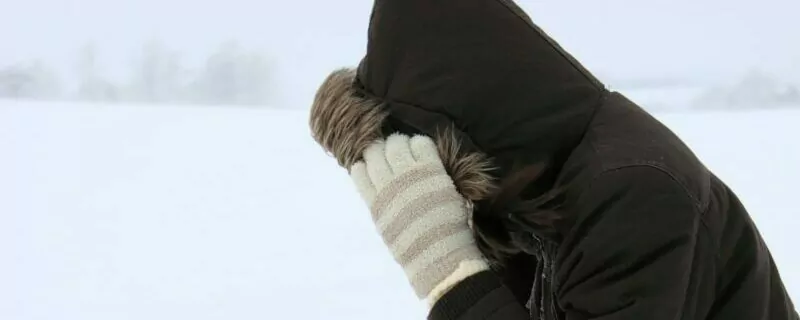
If exposure is one of the leading causes of death in the wilderness for outdoor adventurers, then having the proper clothing in your pack is essential for survival. Hypothermia can set in quickly. Although your brain tries to tell you to do something when you feel cold (shivering), we often ignore this symptom. We decide we will dig our gloves and hat out of our pack when we take our next break. By the time we stop, hypothermia can already be affecting our bodies. Then, we no longer make smart decisions.
Therefore, carrying warm layers and rain gear — and using these items when you first feel cold — is essential for survival. When choosing where to purchase your hats, gloves, fluffy layers, and rain gear, consider one of the following companies: Cotopaxi, Patagonia, The North Face, and Columbia. These companies care about our environment and our communities.
Cotopaxi
Cotopaxi’s motto is “Do Good.” This company works hard to live up to these words. One of the most unique ways that Cotopaxi is protecting our environment is the use of remnant fabrics that would otherwise be discarded to piece together garments. Using leftover fabrics not only reduces waste but also makes each piece a one-of-a-kind item.
Community is important to Cotopaxi, which believes that its business is a vehicle to make an impact. One way Cotopaxi makes an impact is by donating 1% of their profits to programs addressing poverty and supporting community development.
Patagonia
When you think of Patagonia products and apparel, you probably think of activism. In the last few years, they have been vocal about political and environmental issues alike. “Patagonia is in the business to save our home planet.” This company makes its mission to do something about the climate crisis while making excellent products. One percent of Patagonia’s sales are directed to the preservation and restoration of the environment through a program called 1% for the Planet. Patagonia launched another program called Patagonia Action Works, which connects individuals with local programs working to protect our planet. Keeping unwanted items out of landfills is important. Therefore, Patagonia developed the Worn Wear Program. This program re-sales or re-purposes used gear and clothing.
The North Face
The North Face has three tenants of responsibility: empowerment, protection, product.
It wants to empower individuals by introducing them to the outdoors. This company hosts EVENTS programs. These programs give individuals an introduction to outdoor exploration. The North Face also gives money to increase inclusion in outdoor exploration through a grant program called Explore Fund.
The North Face wants to protect Earth and encourages students to take action for climate change through Hot Planet/Cool Athletes presentations. This company is also one of the co-founders of The Conservation Alliance.
Keeping unwanted products out of landfills is important to The North Face; therefore, this company developed the Clothes The Loop program. This program encourages people to drop off unwanted clothing and footwear, in any condition and any brand, at The North Face retail or outlet stores. This company repurposes these items to keep them out of landfills. Also, The North Face has incorporated recycled materials into many of its product lines.
Columbia
Columbia is committed to protecting the environment and preserving natural resources. Current projects focused on preservation include Planet Water and UK National Parks. It is developing innovative products that use responsibly-sourced down feathers and rainwear, with no intentionally added PFCs. Since keeping products out of landfills is important, Columbia developed the ReTHREADS program. Customers drop off items to this program to be reused or resold as is or recycled. Other companies turn these recycled items into fibers for use as insulation, carpet padding, or stuffing for toys.
The Ten Essentials #3: Hydration

According to the Rule of Threes, we can live without water for only three days. Clean water is vital to health. In your backpack, you need to carry a water treatment tool. You can make water potable by adding chemicals, by boiling, and by filtering. Chemical treatments often alter the taste of water and require a wait time of 30 minutes or longer. Boiling water is effective, but you need a vessel that can be heated and a way to make heat. Lengths of boil times also vary according to elevation. Filtering is a quick, easy, and effective way to make water safe to drink. LifeStraw is a brand that wants everyone worldwide to have access to clean drinking water.
LifeStraw
The LifeStraw company did not start as a retail company selling filters. In fact, LifeStraw originally developed filters for people who needed water during emergency situations like hurricanes and tsunamis. This company also developed these filters for developing countries where intestinal worms are an ongoing problem.
LifeStraw is “working to make clean water for all.” For every product purchased from LifeStraw, a school child receives safe water for an entire school year through The LifeStraw Give Back Program. Its Safe Water Fund enables rapid disaster response and supports ongoing school and community programs in places like Kenya, India, and Haiti. LifeStraw also believes in investing in women and girls through education, safe water, and better access to maternal care. This company’s products and humanitarian efforts save lives.
The Ten Essentials #4: Nutrition

Did you know that you could live up to three weeks without food? According to the Survival Rule of Threes, most of us can live without food for this length. However, without food, we become sluggish and fatigued. A lack of energy makes self-rescue difficult. Trapping animals, catching fish, and gathering plants are possible, but these are not easy tasks. These hunting and foraging skills require training and practice. Most rescuers find lost hikers within 48 hours of search initiation. So why not pack some lightweight, nutritious food in your pack? If you enjoy granola bars or energy bars, consider carrying Clif Bars in your pack as your emergency food. Clif Bar & Company is working to protect our food, as well as our environment and communities.
Clif Bar & Company
Clif Bar & Company is committed to developing a sustainable food system. It aims to create healthy food by using organic and certified sustainable ingredients. This company connects directly with farmers and encourages fair labor practices, restorative land practices, and conservation of natural resources.
Clif Bar & Company has developed the Clif Bar Family Foundation with the mission of increasing opportunities for outdoor activity, reducing environmental health hazards, building stronger communities, creating a robust healthy food system, and protecting the earth’s beauty and bounty. Seed Matters is one of the foundation’s special initiatives, advocating for the protection and improvement of organic seeds.
The Ten Essentials #5 and #6: Fire and First Aid Supplies

Most wilderness rescues occur within the first 48 hours of the hiker being reported missing. Survival skill classes teach students to stop and stay put for the first three days if they do become lost. While you are waiting to be found, you should build a fire. Being able to start a fire if you’re lost or stranded in the backcountry can be a life-saving skill. Along with fire-building, having the appropriate first-aid supplies is crucial. Whether you need to clean a wound or stabilize a fracture for evacuation, the right first-aid kit (and training) will ensure you’re prepared for any scenario.
Fire Building
Fire building is an important skill that every outdoors person should learn. To make a successful fire, you should consider three elements: fuel, oxygen, and heat.
Fuel
You will also need three types of fuel: tinder, kindling, and firewood. Tinder includes flammable items that are no bigger than the diameter of a toothpick. Small twigs and wood shavings make excellent tinder. Kindling is pieces of wood that are sized between the diameter of a toothpick and the width of your finger. You need to find enough tinder and kindling that your starter firewood pile is larger in diameter than your arm. Then, you’ll need firewood: anything larger than kindling. The dryer all of these items are, the easier it will be to start a fire.
While gathering your fire-starting supplies, be sure also to gather some dried leaves and pine needles. These items produce a lot of smoke. Rescuers will look for smoke when they are searching for you. Place the leaves and needles on the fire, in small quantities, after the fire is successfully built.
Oxygen
Before you start building your fire, clear away all flammable material. Then, construct a fire ring or a fire mound to prevent the fire from spreading. You will light the tinder and then slowly add the kindling. It is important that you give your flame lots of oxygen. Loading the flame with too much wood will suffocate and extinguish the fire.
Heat
Heat sources may come from a match, lighter, or even a flint and steel. Carrying a fire-starting kit in your backpack, once again, saves time and precious energy. Fire starting kits include both tinder and a heat source. When shopping for a fire starting kit, consider SOL Fire Starting Kits by the Tender Corporation.
first-aid
No backpack is complete without a simple first-aid kit. Your first-aid kit should include supplies to stop an allergic reaction, to control bleeding, and to construct a splint for a broken or sprained limb. The Tender Corporation also makes Adventure Medical Kits and medical supplies.
Tender Corporation
The Tender Corporation is working for the greater good. It supports organizations like the American Hiking Society and National Trail Days for the betterment of trails and natural landscapes. They have a dedicated and permanent endowment created to assist New Hampshire undergraduate students pursuing environmental studies in such areas as ocean science, forestry, wildlife biology, and botany. The Tender Corporation also sponsors Trips for Kids by providing medical kits and medical refills. Trips for Kids gives kids the opportunity to experience nature from the seat of a mountain bike.
The Ten Essentials #7: Navigation
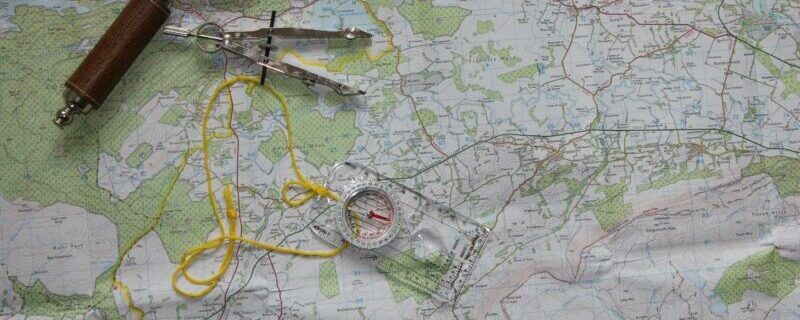
A map of the area in which you are hiking and a compass are essential items in your backpack. These tools, when used properly, can prevent you from getting lost. A map and compass can also help you find your way out of the woods and back to civilization. If you do become lost while out in the backcountry, do stop and stay put for the first three days. After three days, it is time to use your navigation skills and attempt to self-rescue. Purchasing and using a National Geographic Map and a Suunto compass will not only help prevent you from getting lost but will also support environmental conservation.
National Geographic Maps
All proceeds from the sale and licensing of National Geographic Maps go to support the National Geographic Society’s mission of research, education, conservation, and exploration. The National Geographic Maps Company also offers Geotourism Programs. These programs provide travel and exploration of an area by promoting local services, protecting the environment, and limiting negative impacts such as overcrowding and resource pollution.
Suunto Compasses
Suunto has a dedicated environmental policy and mission statement to protect the environment and prevent pollution. This company aims to produce long-lasting, high-quality products that you can repair instead of replace. Suunto seeks to reduce its environmental footprint throughout the manufacturing process and collaborates with its suppliers to improve its sustainability practices. This company minimizes single-use plastics in its packaging and is committed to protecting our environment.
The Ten Essentials #8: Sun Protection
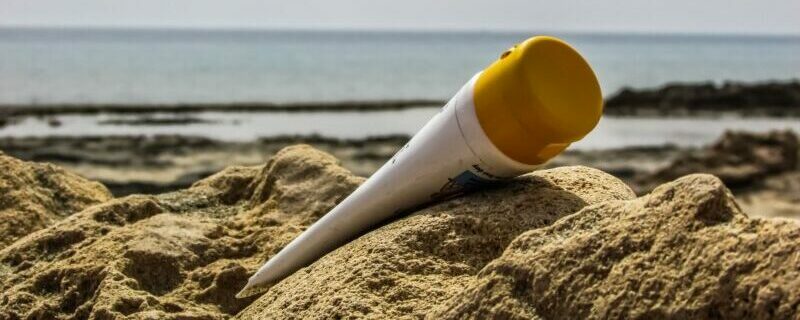
You might be questioning why sun protection is considered one of the Ten Essentials in a survival situation. As wonderful and as necessary as the sun is for our survival and positive mental health, the sun can also be very damaging. Sunburns are not only uncomfortable, but they also damage our skin. Our skin’s primary functions are protection, thermoregulation, and sensation. If blisters form and pop from a sunburn, our bodies are now at risk of an infection. When our skin burns, it can no longer effectively cool our bodies through sweating. And, of course, when our skin is damaged, so is our ability to feel things in a normal and appropriate manner. Wearing sunscreen and reapplying it at appropriate intervals can prevent sunburns and protect our skin.
The sun can also burn our eyes, specifically our corneas, resulting in pain. In snowy environments, the sun can even cause temporary blindness, called snow blindness. Snow blindness can be disorienting. Symptoms include pain in the eyes, headache, blurred vision, and even temporary vision loss. Snow blindness is easily preventable by simply wearing sunglasses with UV protection.
You should carry sunscreen and sunglasses in your backpack and wear them/apply them as necessary. When shopping for these products, consider Zeal Optics Sunglasses, Solo Eyewear, and Badger Sunscreen. These companies not only protect us from the sun but also are working for the greater good.
Zeal Optics Sunglasses
Zeal Optics, based in Boulder, Colorado, creates sustainable sunglasses by using plant-based products formed out of the castor plant. This plant requires little maintenance and grows well in between food crops or in under-utilized spaces. Castor-based plastic contains fewer impurities than petroleum-based plastics; therefore, the sunglasses’ lens are clearer.
Zeal Optics also focuses on reducing production waste with the development of the first zero-waste production lab in the world. This lab collects the excess plant-based plastic shavings and works with other manufacturers to reutilize the materials in items like alarm clocks.
With a mission to protect and sustain the environment, Zeal Optics supports One Percent for the Planet, the National Forest Foundation, Project 5480, and Protect Our Winters. Zeal Optics also supports organizations that give individuals an opportunity to experience the outdoors that may not otherwise be introduced to the wilderness experience. Currently, Zeal Optics supports More Than Just Me, Epic Experience, and SOS Outreach.
Solo Eyewear
Solo Eyewear states, “At SOLO Eyewear, we know the world doesn’t need another sunglass company. The world needs companies that care about people and the planet. That’s why we at SOLO exist!”
Solo Eyewear donates 10% of its profits to programs like Aravind Eye Care System and Restoring Vision. These funds provide eye exams, eyeglasses, and cataract surgeries to individuals in developing nations. Look for and purchase products with the SOLOsTM logo. Solo Eyewear makes these items with the SOLOsTM logo using repurposed bamboo or recycled plastic. In addition, Solo Eyewear repurposes packing materials and defective sunglasses for parts. Lastly, this company sources its accessory products ethically from a group of female artisans in Guatemala. Paying these women fair wages helps their families rise out of poverty.
Badger Sunscreen
Badger’s work for the Greater Good includes supporting organic, sustainable agriculture through its purchasing methods, practicing environmental responsibility, and providing personal and social healing through charitable giving. This company produces sunscreens that are considered Reef Safe or Reef Friendly. Badger also donates 10% of pre-tax profits to non-profit organizations that focus on the health and welfare of children (including environmental education), local organizations serving the local community, and the promotion of peace and wellbeing. Badger also matches a percentage of employees’ contributions to charitable causes of the employees own choosing.
The Ten Essentials #9:Illumination
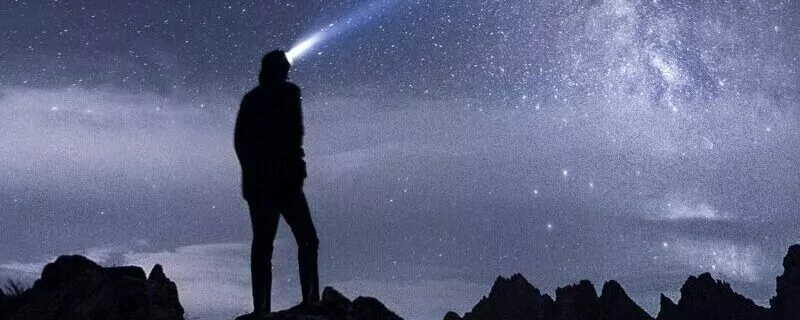
No one enjoys tripping and stumbling around in the dark, especially in the woods. For many, darkness heightens our fears. What is that large shape in front of me? Is it a tree or a bear? Is that a root or a poisonous snake? Am I still on the trail?
You should prepare for darkness and carry a headlamp or lantern as part of your essential hiking items. Not only does light help us find our way, but light also makes tasks performed at night easier to accomplish. Black Diamond makes headlamps as well as many other outdoor goods. MPOWERD makes collapsible, solar power lanterns. These Luci Light Lanterns are lightweight and easily attached to the outside of your pack for sun-powered charging while you are hiking. Both Black Diamond and MPOWERD are companies concerned about protecting and preserving our environment.
Black Diamond: Headlamps
“Conservation and preservation are foundational to Black Diamond. These tenets are part of the mission of BD. We will always strive to protect access to the mountains, crags and desert landscapes where we pursue our sports.”—John Walbrecht, President of Black Diamond
Black Diamond supports numerous organizations and efforts to preserve the places where we climb, ski, and trek. These groups include The Access Fund, American Institute for Avalanche Research & Education, The Conservation Alliance, Friends of Colorado Avalanche Information Center, Salt Lake Climbers Alliance, Save Our Canyons, Utah Avalanche Center, and Utah Dine Bikeyah.
Black Diamond actively seeks to reduce its footprint on our environment. In Asia, the Black Diamond plant uses a closed-loop anodization process that reuses and recycles 2000 tons of wastewater. Black Diamond recycles all of its scrap metal and excess cardboard in Utah and China. Wind powers twenty percent of the Salt Lake City, Utah, Black Diamond headquarters. Plus, the Salt Lake City employees commune an estimated 410, 000 miles by way of carpool, bus, transit, bicycle, and foot every year. Separating oil from Black Diamond’s oil and water mixtures and sending the waste oil out to be recycled is another method this company uses to reduce waste. Black Diamond also purchases cardboard containing an average of 35% post-consumer recycled material.
MPOWERD: Luci Light Lanterns
Clean, reliable energy for all is MPOWERD’s motto. Working with over 650 NGOs and non-profits, MPOWERD supplies clean energy to those without access to energy. MPOWERD believes that everyone deserves clean, reliable, affordable energy. This company is also an advocate for our planet working to reduce CO2 emissions, to minimize single-use products, and to inspire others to take environmental action.
The Ten Essentials #10: Knife
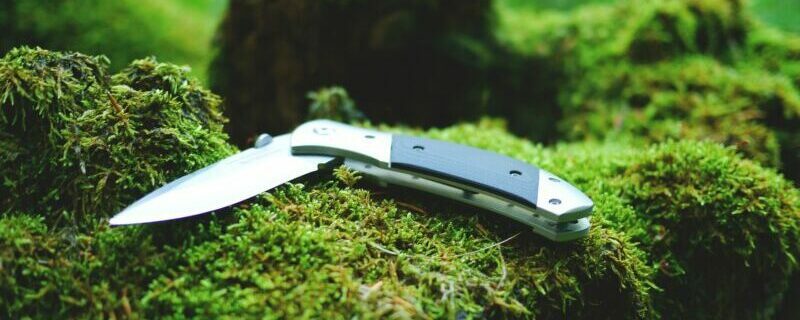
A knife should be in your pack or on your hip because it is the last of the Ten Essentials. Your knife should be sharp and long enough that you can use it to split wood, but small enough to use for carving, cooking, and first aid. I recommend a five-inch, fixed blade knife. Before you take your new tool into the backcountry, take some time to learn proper knife handling skills (as well as knife sharpening skills.)
Yes, you can use a sharp rock to cut things. However, knowledge and knife skills can save your life. The Bear Gyllis Ultimate Pro Fixed Blade knife by Gerber Gear meets all of my personal criteria, and Gerber Gear is a company working for the greater good.
Gerber Gear
Gerber Gear is a Recycle at Work award-winning business. It recycles 150 tons of materials annually. This company collects 72 tons of bead glass remains and distributes it to national suppliers for use in abrasive medias. Another way Gerber Gear recycles is by donating all of its unwanted goods such as used furniture, cubicles and unused knife sheaths.
Eliminating disposable coffee cups in all vending machines on Gerber Gear’s campuses is another active step this company is making to protect our environment. By launching new packaging designs, Gerber Gear is actively preventing waste at the consumer level, and Gerber Gear is a participant in the Energy Trust of Oregon. Also, it has adopted a sustainable purchase policy and hosts regular sustainable events for its staff. Gerber Gear also partners with Backcountry Hunters and Anglers, Rocky Mountain Elk Foundation and the American Eagle Foundation to help preserve and protect our wildlife and lands.
Purchasing Gear
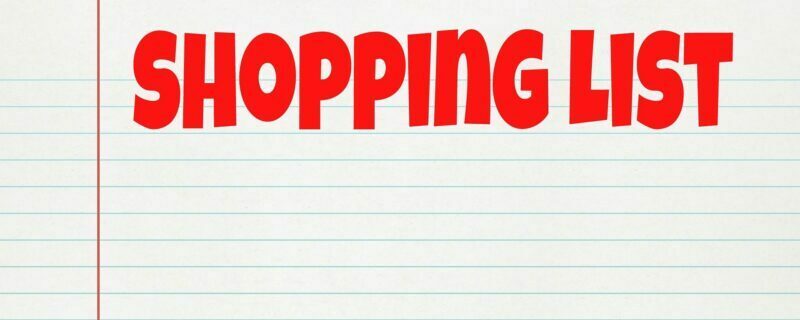
You need the Ten Essentials in your pack. So why not purchase these items from companies that are working for the greater good? When gathering your Ten Essentials, head to REI if you are interested in a one-stop shopping trip. REI is an ethically-driven company that has a vast stewardship program. This program includes concentration on protecting our climate and environment and public lands, supporting fair labor, promoting outdoors for all, producing sustainable products, making gear that lasts, reducing waste, and collaborating for good. Check out REI’s Product Sustainability Guidebook for details on how REI is making a difference.
Conclusion
This article lists only a few of many companies that are working for the greater good. If one if your favorite brands is not highlighted in the article above, go to its website and look for information on that particular company’s sustainability and humanitarian practices. All information gathered in this text was obtained from each individual company’s website.
Wildland Trekking
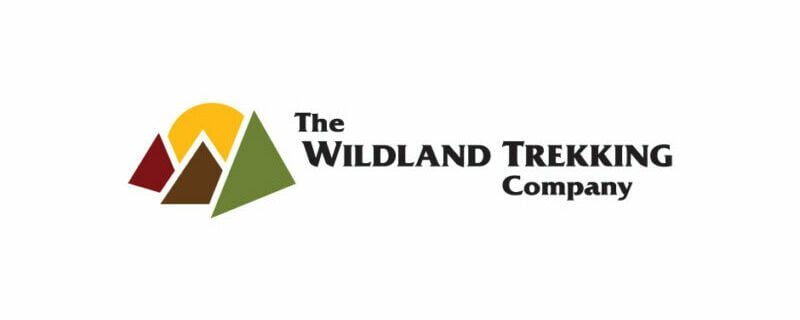
If you are new to adventuring in the outdoors, or only occasionally hi the trails, another way you can reduce your environmental impact is by sharing goods and carpooling to trailheads. When you are taking a guided adventure with Wildland Trekking, the gear provided on each adventure is used on a weekly — if not daily — basis. Sharing gear prevents over-manufacturing of products that eventually end up in landfills. Wildland Trekking also provides transportation for the group to and from trailheads – carpooling with every adventure.
Wildland Trekking’s conservation efforts begin by providing extraordinary hiking adventures. The goal of these adventures is for the individual to have an exceptional experience that bonds him/her with nature. In doing so, the hope is that those who bond with nature will become nature’s advocates who protect our wild lands and wildlife. It is Wildland Trekking’s dream to preserve our natural resources and protect our planet from further destruction. This company believes this dream begins with an introduction to all that wilderness has to offer.
If you would like a guided trekking adventure by a company working for the greater good, look no further than Wildland Trekking.
Hike with a Guide
Guided Hiking Adventures
As the world’s premier hiking and trekking company, Wildland believes in connecting people to fantastic environments in amazing ways. Wildland Trekking Company offers an array of incredible hiking and trekking experiences in nine states and 11 countries. Read more about our world-class destinations.
To learn more about our guided backpacking trips and all of our award-winning hiking vacations, please visit our website or connect with one of our Adventure Consultants: 800-715-HIKE.




